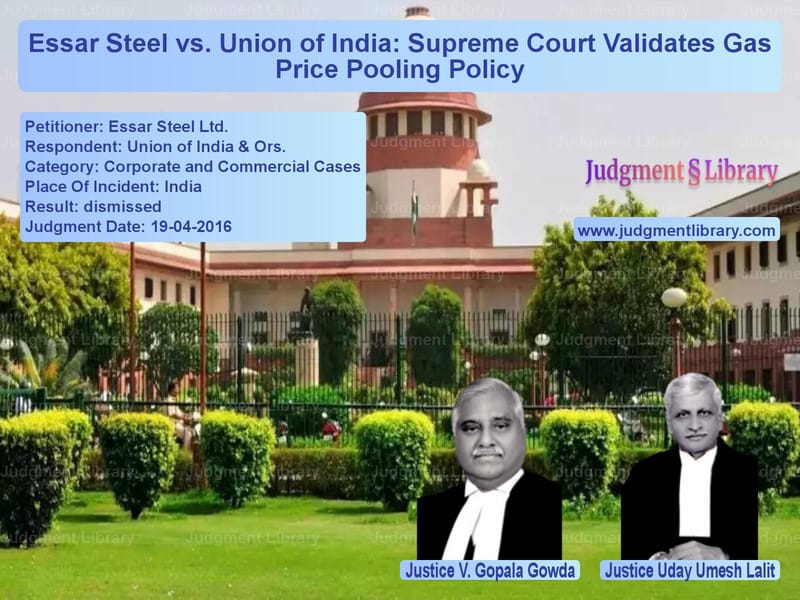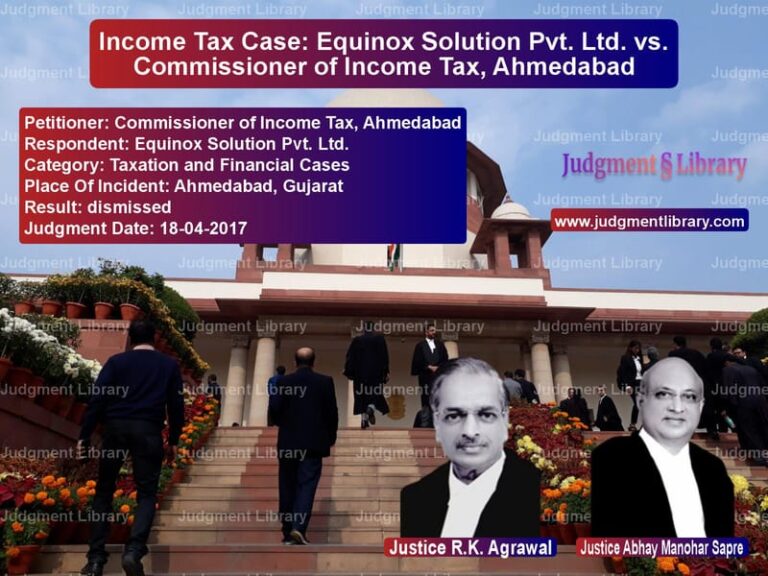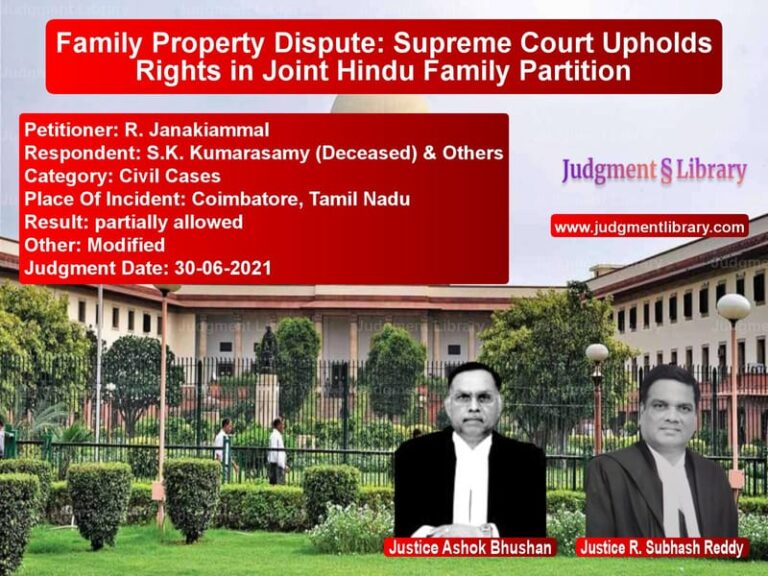Essar Steel vs. Union of India: Supreme Court Validates Gas Price Pooling Policy
The Supreme Court of India delivered a crucial judgment in the case of Essar Steel Ltd. vs. Union of India & Ors. on April 19, 2016, addressing the legality of a government policy on gas price pooling. The court upheld the policy decision dated March 6, 2007, that mandated a uniform pooled pricing mechanism for Regasified Liquefied Natural Gas (RLNG). The judgment dismissed the appeals filed by Essar Steel Ltd. and other companies that challenged the policy, arguing that it violated their contractual rights and led to financial losses.
This landmark ruling reaffirmed the government’s authority in formulating economic policies in the public interest. The court held that the policy was neither arbitrary nor violative of fundamental rights, as it aimed to stabilize gas pricing for all consumers under long-term contracts.
Background of the Case
India imports large quantities of natural gas, which is liquefied and transported before being converted back into gas. The liquefied gas is known as Liquefied Natural Gas (LNG), and once it is regasified in India, it is termed RLNG.
Essar Steel, the appellant in the case, had entered into long-term contracts with Indian Oil Corporation Limited (IOCL), Bharat Petroleum Corporation Limited (BPCL), and Gujarat State Petroleum Corporation Limited (GSPCL) for the supply of RLNG. The agreed-upon price was $2.9412 per million metric British thermal unit (MMBTU), fixed until December 31, 2008. However, on March 6, 2007, the government issued a policy directive that changed the pricing mechanism, mandating a uniform pooled price for all customers. As a result, the price increased from Rs. 135 per MMBTU to Rs. 207.02 per MMBTU.
Essar Steel and other affected parties challenged this policy before the High Court of Gujarat, arguing that it unilaterally altered their contractual terms. However, the High Court upheld the government’s decision in a 2:1 majority ruling, leading Essar Steel to file an appeal before the Supreme Court.
Petitioners’ Arguments
The petitioners, represented by senior advocate Abhishek Manu Singhvi, contended that the policy was arbitrary and violated their contractual agreements. The primary arguments presented were:
- Violation of Contractual Rights: The petitioners argued that the agreements between Essar Steel and gas suppliers had fixed prices, and the government’s intervention unlawfully altered those terms.
- Absence of Legislative Backing: It was contended that an executive policy cannot override private contracts unless backed by legislation.
- Unjust Enrichment: The increased price burden was unfairly passed onto the appellants, whereas a single entity, Ratnagiri Gas and Power Private Limited (RGPPL), benefited from the policy.
- Price Fixation is a Legislative Function: The petitioners cited legal precedents establishing that price regulation should be undertaken by the legislature, not the executive.
- Violation of Article 14 of the Constitution: The policy was allegedly discriminatory as it disproportionately affected some industries while benefiting others.
Respondents’ Defense
The Union of India, represented by Solicitor General Ranjit Kumar, defended the policy on the following grounds:
- Public Interest: The decision was taken to stabilize RLNG pricing and ensure affordability for all consumers.
- Executive Authority: The government was empowered under Article 73 of the Constitution and Entry 53 of List I of the Seventh Schedule to regulate petroleum and gas prices.
- Benefit to Multiple Entities: Contrary to the petitioners’ claim, the policy benefited several public sector undertakings and not just RGPPL.
- Pass-Through Pricing: The appellants had already passed on the increased costs to their consumers, negating their claims of financial harm.
Supreme Court’s Ruling
The Supreme Court upheld the validity of the government’s policy, stating:
“The Union of India, through its Empowered Group of Ministers with expert advice, has taken the decision to pool the price of RLNG on a non-discriminatory basis. This policy does not violate fundamental rights and ensures economic stability.”
The court ruled that policy decisions taken in public interest should not be interfered with unless proven to be arbitrary, unreasonable, or unconstitutional. It also held that contractual rights do not supersede public policy measures implemented by the government.
Conclusion
This ruling reaffirmed the government’s authority in implementing economic policies in the national interest. The Supreme Court dismissed the appeals, emphasizing that:
- The policy was formulated to ensure equitable gas pricing.
- The appellants had not demonstrated that the policy was discriminatory.
- The increased pricing was a necessary measure to sustain RLNG supply.
Ultimately, the judgment established a precedent that executive policies, when taken in the interest of economic stability, cannot be struck down merely because they affect private contractual rights.
Don’t miss out on the full details! Download the complete judgment in PDF format below and gain valuable insights instantly!
Download Judgment: Essar Steel Ltd. vs Union of India & Ors Supreme Court of India Judgment Dated 19-04-2016-1741854647439.pdf
Direct Downlaod Judgment: Direct downlaod this Judgment
See all petitions in Company Law
See all petitions in Corporate Governance
See all petitions in Shareholder Disputes
See all petitions in Judgment by V. Gopala Gowda
See all petitions in Judgment by Uday Umesh Lalit
See all petitions in dismissed
See all petitions in supreme court of India judgments April 2016
See all petitions in 2016 judgments
See all posts in Corporate and Commercial Cases Category
See all allowed petitions in Corporate and Commercial Cases Category
See all Dismissed petitions in Corporate and Commercial Cases Category
See all partially allowed petitions in Corporate and Commercial Cases Category







